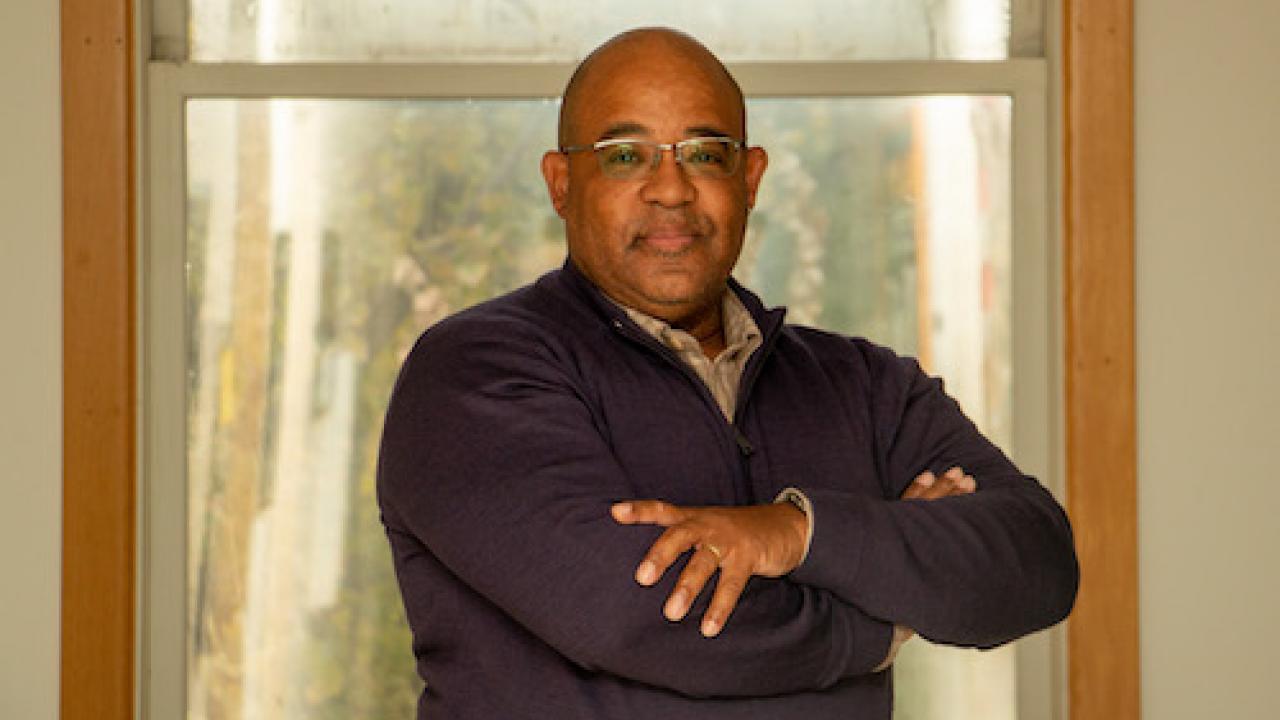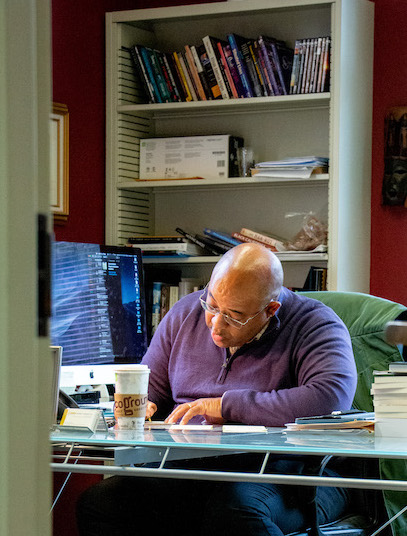
My Process: Transparency and Humanity for Teaching and Mentoring “First-Gen” and Underrepresented Students
By Milmon F Harrison, Associate Professor, Department of African American & African Studies
Introduction
I am not an expert in pedagogy. Nor do I have any particular interest in mastering the literature on best practices in teaching and learning. I humbly defer to those with the knowledge and research background to be able to speak authoritatively to such issues. I do, however, have more than two decades of university teaching experience, and at least a decade of administrative experience working with students from a variety of backgrounds, including underrepresented minority and first generation college students. In this post, I share some of the ways in which I have intentionally gone about transparently transforming my practice to create a humane space for a greater degree of effectiveness in the teaching and mentorship of undergraduate and graduate students from first generation and/or underrepresented minority backgrounds.
My History: “Where I’m From”
My teaching practice is informed by my experience as a student. Like so many of our students, I was first generation as an undergraduate at UC Davis and, even more so, as a graduate student at UC Santa Barbara. I am proud to say that I come from solidly working class people, labor union members, migrants from the Jim Crow south to California. My mother took some courses at our local community college when I was in high school, but she never completed a degree beyond her high school diploma. My father did not even complete high school; his highest level of education is 11th grade. Statistically, based on my father’s level of education, I should not have a doctorate. But due to the intervention of 1960s Great Society programs such as Head Start, virtually free California Community College tuition, and the erstwhile existence of Affirmative Action in the University of California admissions process—not to mention a family that always made it known that I was expected to “make something of” myself—I was provided opportunities and space to work for what I have managed to achieve. (Read Milmon’s first gen story here.)
Similar to my experience as a first-gen undergraduate and graduate student, I find that some of the students I encounter have never met a professor who started off in life from a working class background. When I mention that my family and I lived in the projects of Hunters Point when we first came to California, or that we lived in the Haight-Ashbury district, and then moved to Stockton, where I was bused to school in Lodi until graduation from high school, there is almost always someone who lets out an audible gasp of what I assume to be surprise.
The practice of making time to share the story of my unconventional, circuitous journey is an important part of what I have been doing to help mentor first gen and underrepresented students.
The following sections contain my approach to helping students navigate their educational journeys and the “Top Five” practices I have incorporated into my work and which guide my instructional practice.

My Approach
To start: I made myself vulnerable; I shared my humanity and the common experience that I had with them as a first generation college student, first generation graduate student, and first generation professor. With both undergraduate and graduate level students, I share what I am just now learning about writing productivity and the power of setting aside small, consistent blocks of time for “touching” one’s work daily, rather than waiting for a large chunk of time to appear so you can binge write.
As a “first gen” student I had so much to learn about writing and research and publishing and how to navigate a space that still feels foreign and, admittedly, hostile at times. I have learned since my time as an undergraduate, as a graduate student, and as a professor at a Research 1 university, that there were (and still are) so many things that I was unprepared for, that I had never heard, and that others just assumed that I knew.
We don’t always even know what it is that we don’t know, so it is unreasonable to expect people to “just ask.” I think we have to ask our questions differently.
For example, rather than saying “Now, do you have any questions for me?” perhaps it would be better to ask open-ended questions, such as “Do you know what resources are available for you and how to access them? Did you know that there are financial aid resources for emergencies when a student has to get home quickly, for example, a death in the family? Did you know that there is mortgage assistance available for new faculty to purchase a house, even if they don’t live directly in the same city or town as their university workplace?” I did not know or fully understand that simple thing that might have made a difference in my experience.
My Top Five Practices
- Assume Nothing: First, we cannot assume that everyone who makes it to the university or to graduate school or who becomes a professor knows everything about the process, the expectations, or the world that they have managed to claw their way into. I learned this a long time ago in teaching undergraduates. We cannot assume that everyone knows how, for example, to make an outline before they start writing.
- Cultivate Safety: We must be intentional about creating a space that is safe for those students who do not come from backgrounds in which they have already learned study skills, note taking and reading skills, etc. We need to make it a space where they will feel comfortable to ask “dumb” questions that, as we all know, are not dumb at all, but that first gen/underrepresented students often feel as thought they are the only ones who do know and are mortified to call attention to what they imagine is uniquely their ignorance. One way I do this is through the use of music. I use “walk-in” music to bring students into the space of the class (see Soundtrack of Learning).
Another thing I do is say out loud that this is a safe space for asking any question that they might have, no matter how “dumb” they may think it is. And then I have to be consistent with that invitation in the way I handle questions that do arise. I have personally been in classroom settings in which the instructor said it was ok to ask questions, but then they reacted to certain questions in ways that belied their words.
- Co-create Community: You also have to get the students themselves to behave as a supportive community of learners and not as competitors. I routinely ask students to share their resources with one another. If some people have the book and others don’t—for any number of reasons, including the bookstore’s not ordering enough copies, Amazon delays, etc.—then we pull together as a community. I tell them from the first day that we are a community that happens to meet two days a week for ten weeks. So we practice those things, and I try to model them for the students.
- Show Up: I tell students that each day I will bring my whole self to the classroom, and I expect them to show up and bring their whole selves to class as well. I let them know they may see me cry, be angry or very sad in response to the subject matter or the news of the day or any combination thereof. The point that I am making for students from underrepresented backgrounds, and everyone else, is that although we may be reading about immigration or racial, class, and/or gender oppression in our books and in our classroom lectures and discussion, some of us in the room are walking out the doors of my classroom and living those experiences every single day. I want those who are not experiencing those forms of oppression to realize that, yes, they do know people who are being oppressed while they enjoy the privilege of not being part of that group. It also lets the the underrepresented students know that I understand and share their experience (to the extent that it is the case) and I’m not just teaching material in a detached, emotionally distant manner. I bring my whole self to my discussion of certain aspects of slavery or lynchings during the Jim Crow era by letting them know that some days talking about these historical realities are much harder than others because I “feel” the weight of the ancestors’ anguish on those days.
- Leverage Diversity of Experience: I remind the students that I, like so many of their classmates, their colleagues, not only study the history of oppression but I’m also living that oppression as well. But by the same token, I teach them that as a man in a patriarchal society, I am part of the privileged group relative to women. I also point out that although I come from working class origins, I am now part of a class of people with an advanced degree, something that affords me a level of privilege—especially in terms of job discretion, flexibility with my time, and autonomy—that most of my relatives and many others in my community do not share. So, one can be both part of the oppressed and the oppressor groups at the same time. In doing so, I’m trying to model that approach and perspective to interacting with people from backgrounds different from ours.
The Final Takeaway
Keep learning. What has ultimately been “transformed” in the process is me, the instructor. I am transparent about that and I hope students see the humanity of this approach. We encourage them to be life-long learners but we also have to be intentional about modeling that for them. I talk to students about the fact that a few years ago I followed my curiosity in web and graphic design, earning a certificate at a local college. Web design was not something that was an option for me to choose a major when I was an undergraduate, but I became a student again and took classes with undergraduates and learned to code. I also show students my photographic and digital storytelling work, and discuss how I am bringing all these threads together in the current research project in which I am currently engaged. I want them to see that by following their curiosity and their passions, they are adding to the number of tools in their toolkit. As I always say, we never really know how some skill we may have picked up along the way will come in handy at some unexpected point in the future. We have to remain open to all the possibilities.
Request a Reflective Teaching Journal
As you think about ways to reflect on how to support First Generation students, let CEE support your process with a free journal. Complete the following form and we will send you one via campus mail.
